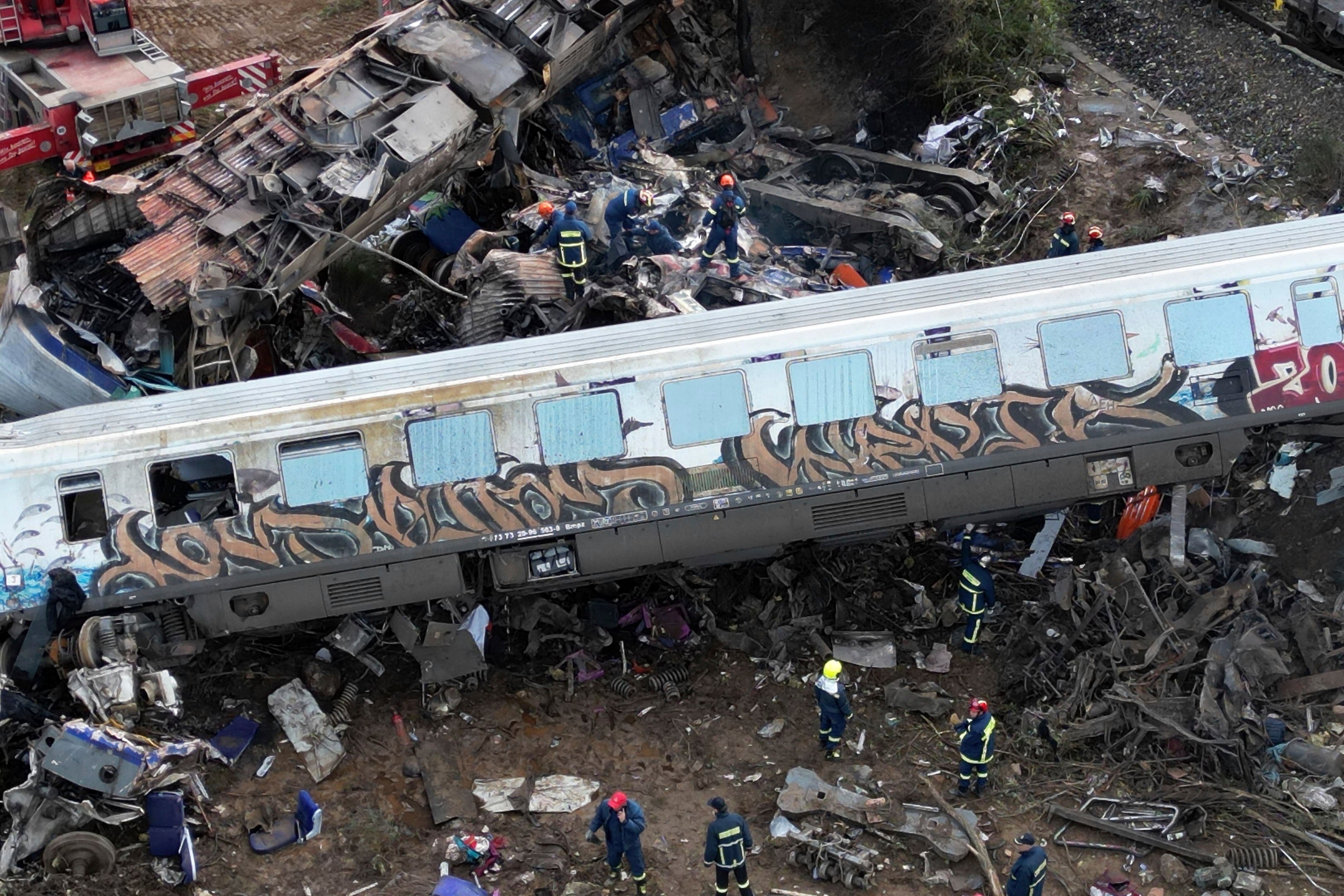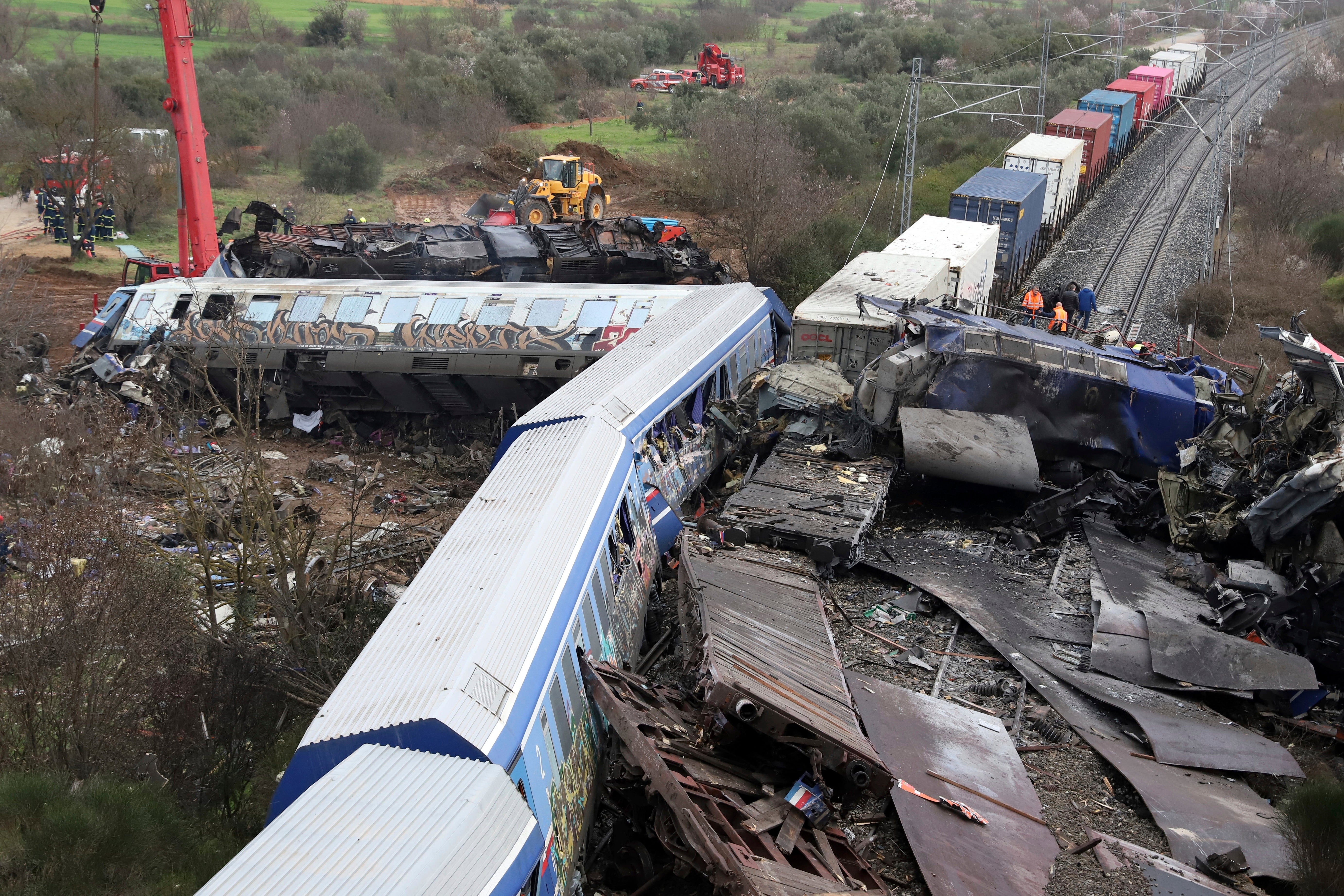‘Tragic human error’ blamed as Greece train crash and fireball kills at least 43
Many of the victims were university students returning to Thessaloniki after a holiday weekend
Your support helps us to tell the story
From reproductive rights to climate change to Big Tech, The Independent is on the ground when the story is developing. Whether it's investigating the financials of Elon Musk's pro-Trump PAC or producing our latest documentary, 'The A Word', which shines a light on the American women fighting for reproductive rights, we know how important it is to parse out the facts from the messaging.
At such a critical moment in US history, we need reporters on the ground. Your donation allows us to keep sending journalists to speak to both sides of the story.
The Independent is trusted by Americans across the entire political spectrum. And unlike many other quality news outlets, we choose not to lock Americans out of our reporting and analysis with paywalls. We believe quality journalism should be available to everyone, paid for by those who can afford it.
Your support makes all the difference.Greece’s transport minister resigned on Wednesday after two trains slammed head-on into each other, killing at least 43 people in the country’s worst-ever rail crash.
The impact threw entire carriages off the track and temperatures in the wreckage reached 1,300C after it was engulfed in flames.
“It’s an unthinkable tragedy,” Greek prime minister Kyriakos Mitsotakis said as he visited the site of the crash, promising a full investigation but saying it appeared to be “mainly due to a tragic human error.”
Tearful transport minister Kostas Karamanlis submitted his resignation, saying he felt it was his "duty" to step down “as a basic indication of respect for the memory of the people who died so unfairly”.
He said he was also taking responsibility for Greece’s “long-standing failures” to fix a railway system he described as unfit for the 21st century.
Passengers kicked through windows to escape the inferno, others were flung up to 40 metres after the train slammed into a freight train travelling in the opposite direction on the same track.
“There was panic ... the fire was immediate, as we were turning over we were being burned, fire was right and left,” said Stergios Minenis, a 28-year-old passenger who jumped to safety from the wreckage. He described the bang of the crash and the subsequent fire as “nightmarish”.
Angelos Tsiamouras told Greek broadcaster ERT the crash had felt like an earthquake, and he smashed the train window using his suitcase. “We broke the windows with our backs,” another unnamed passenger told the broadcaster.
The passenger train was carrying 342 travellers and 10 crew, while two people were on the cargo train, according to Hellenic Train data. The fire service said that of the people admitted to hospital after the crash, 15 had been released by Wednesday evening.
Of the 57 wounded still being treated, six remain in critical condition and are being treated in an intensive care unit.
Many of the dead are thought to be university students, returning to Thessaloniki – which has a large student population – after a long holiday weekend marking the start of Greek Orthodox lent.

The two trains had been running towards each other on the same track “for many kilometres” before the crash, government spokesperson Giannis Oikonomou said.
As rescuers searched the wreckage of the crash for other survivors for hours after the crash, officials started the work of figuring out how the two trains ended up on the same track. The local station master, in charge of signalling, has been arrested and charged with causing mass deaths through negligence and causing grievous bodily harm through negligence, a police official said. The 59-year-old man has denied any responsibility for the accident, attributing it to a possible technical failure, the official said.

In Larissa, where many victims of the crash had been taken, Nikos Makris sat on a pavement outside the hospital. His wife’s sister was travelling in one of the first two carriages.
“She is missing. We have been waiting here since 2am,” he said. “Now we are waiting to do a DNA test. We will be lucky to have a body to bury,” he said.
Survivors who did not need to be treated in hospital were evacuated to Thessaloniki, where one woman ran to embrace her daughter as she disembarked from a bus with other survivors. Another woman, who was waiting there, said her child was not picking up the phone.
The Greek government has announced three days of national mourning.
The Tempi valley, where the crash occurred, is a notorious spot for accidents. In 2003, 23 schoolchildren were killed in a bus crash there. In 1972, 19 people were killed when two trains collided head-on outside Larissa.



Join our commenting forum
Join thought-provoking conversations, follow other Independent readers and see their replies
Comments